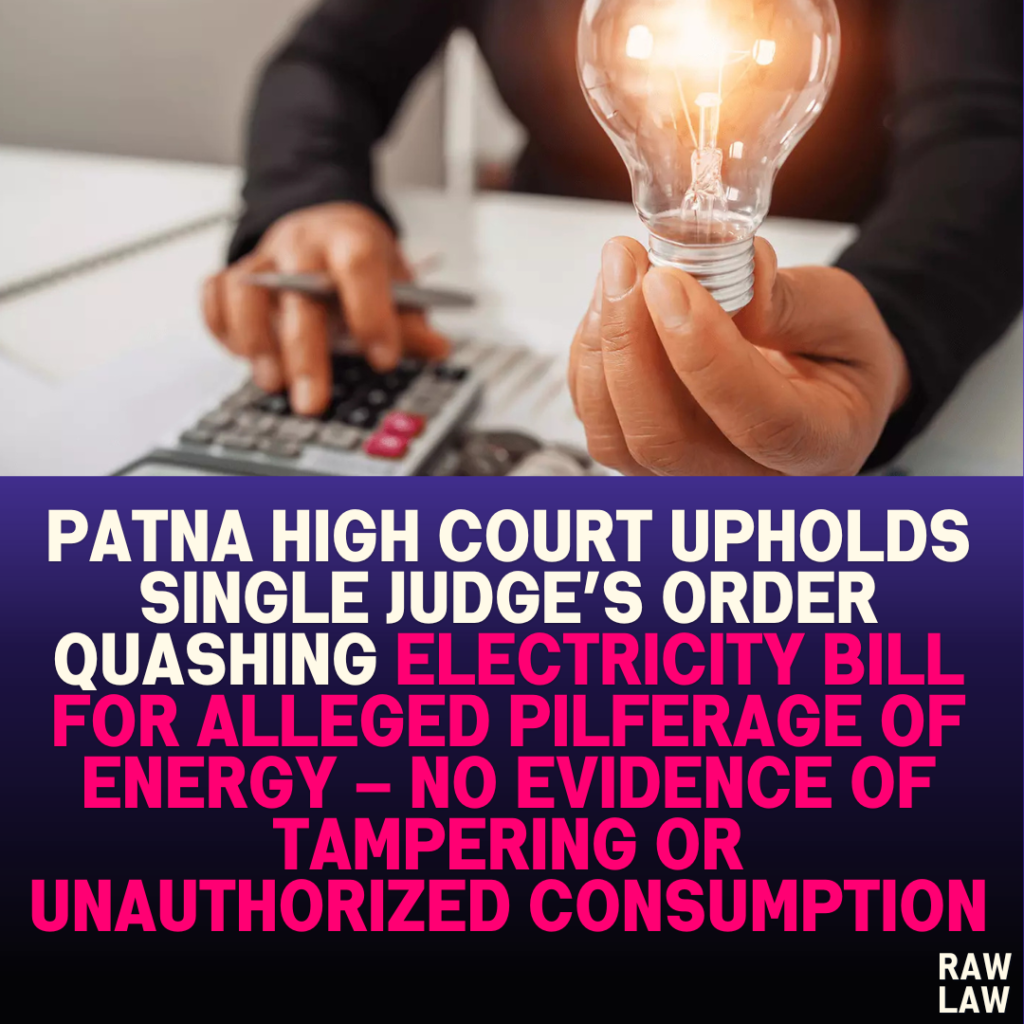Court’s Decision:
The Patna High Court dismissed the appeal filed by North Bihar Power Distribution Company Ltd., affirming the judgment of the Single Judge which quashed the electricity bill amounting to Rs. 4,38,79,501/-, raised against the respondent for alleged pilferage of electricity. The court held that the findings of the Three Men Committee, constituted to investigate the issue, revealed no evidence of tampering or unauthorized consumption. The bill was set aside, and the High Court directed the Board to refund Rs. 10 Lakhs, deposited by the respondent as per an earlier interim order, with 5% simple interest.
Facts:
The writ petitioner, a company under the Companies Act, had entered into a High-Tension supply agreement with the Bihar State Electricity Board (now succeeded by North Bihar Power Distribution Company Ltd.). The contract demand was enhanced to 3000 KVA during the relevant period. An inspection carried out by the Board on 27.03.1999 found discrepancies in the seals of the electric meter, leading to an FIR under Sections 379 and 411 of IPC read with Sections 39 and 44 of the Indian Electricity Act, alleging theft of 6,84,000 units of electricity, causing a loss of Rs. 18,88,000/- to the Board. The Board issued a demand notice for Rs. 4,38,79,501/- for theft of energy and a penalty of Rs. 52,80,325/- under Clause 16.9 of the 1993 Tariff.
Issues:
- Whether the allegations of tampering with the electric meter justify the issuance of the impugned electricity bill?
- Whether the Three Men Committee’s provisional report is binding, despite the absence of a final report?
- Whether the Board’s failure to provide necessary data affects the validity of its claims?
Petitioner’s Arguments:
- The petitioner argued that there was no unauthorized load connected beyond the contract demand, and the FIR did not result in a criminal prosecution.
- It was contended that the Three Men Committee was constituted based on the consent of both parties, and its findings, even if provisional, hold relevance as the Board failed to provide the requisite data.
- The petitioner asserted that there was no evidence of tampering, as the seal irregularities observed were minor and did not indicate theft.
Respondent’s Arguments:
- The Board argued that the provisional nature of the Three Men Committee’s report makes it non-binding, and only a final report could have such authority.
- It was contended that the irregularities in the seals (broken arrow head and absence of signature) clearly indicated tampering and hence justified the presumption of pilferage under Clause 16.9(B) of the 1993 Tariff.
Analysis of the Law:
The court examined Clause 16.9 of the 1993 Tariff, which deals with contingencies involving tampering and unauthorized consumption. It was found that Clause 16.9(B) lists specific conditions, such as the removal of CT connections or tampering with the CT ratio, none of which were applicable in this case. The court emphasized that in the absence of any evidence pointing to these contingencies, no presumption of theft could arise.
Precedent Analysis:
The respondent relied on Ram Chander Prasad Sharma vs. State of Bihar; AIR 1967 SC 349, where it was held that tampering should be established by showing dishonest use of energy. However, this was distinguished by the court as pertaining to criminal proceedings, which have a higher standard of proof.
The Board cited JMD Alloys Limited vs. Bihar State Electricity Board; (2002) 1 PLJR 21, arguing that similar facts warranted penal assessment. However, the court noted that JMD Alloys involved established tampering, which was not the case here.
Court’s Reasoning:
The court reasoned that the findings of the Three Men Committee, although provisional, were valid as the Board did not supply the necessary data to finalize the report. The court held that mere irregularities in the seals did not amount to tampering or pilferage. Additionally, the absence of any recorded excess consumption or connected load beyond the contract demand negated the allegations.
Conclusion:
The appeal was dismissed, and the court upheld the decision of the Single Judge, setting aside the impugned bill. The High Court directed the Board to refund the Rs. 10 Lakhs deposited by the respondent with 5% simple interest.
Implications:
The judgment reinforces the principle that mere irregularities or discrepancies in meter seals do not suffice to presume theft or tampering. Utility companies must provide concrete evidence of unauthorized consumption or tampering to justify penal assessments.



